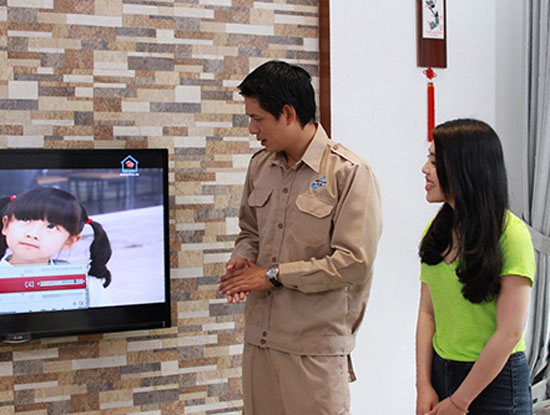

HTV-TMS has 700,000 subscribers after seven years of operation, holding 9 percent of the market share. In the past, it was allowed to provide services in HCM City only, but since 2010, its services have been available in 29 cities and provinces.
Nguyen Duc Hoa, general director of HTV-TMS, the service provider, complained that it was difficult to develop cable TV services, and that the number of subscribers had remained unchanged over the last three to four years.
HTV-TMS is not alone. Other Vietnamese pay-TV firms also complain that they have lost many clients recently. This explains why the number of subscribers has not increased, even though they get new subscribers.
Hoa said there are “problems existing in the pay-TV state management”, and that the Ministry of Information and Communication needs to tighten control over the market to support authentic service providers.
Hoa complained that too many barriers still exist, preventing television companies from expanding their service coverage. Though HTV-TMS is now allowed to provide services in 29 provinces and cities, it still cannot do anything in some localities if they do not receive approval from local authorities.
Television companies have been asked by the watchdog agency to provide subtitles when showing foreign TV channels so as to ensure customer benefits.
The regulation, in the eyes of service providers, is also a barrier which has caused problems for them.
Hoa said the requirements on censoring, editing and translation are major obstacles to providing foreign TV channels.
Since HTVC cannot transmit many foreign TV channels, it has lost many clients who are expats in Vietnam.
“The clients would rather watch foreign TV channels with unofficial IPTV,” Hoa said. Unofficial IPTV is understood as a type of illegal OTT TV.
“We have lost many clients in HCM City to the hands of OTT TVs,” he added.
Commenting on measures to tighten control over the pay-TV market, Vu Tu Thanh from the US-ASEAN Business Council noted that the watchdog agency needs to think carefully when creating policies to manage the market. The policies need to be designed in a way that allows enterprises to develop.
He said Vietnam should learn a lesson from China, where youth watch programs on the internet instead of on TV, as many international TV channels on pay-TV are restricted.
The same problem has also occurred in other countries, where the watchdog agencies have tightened the control over the pay-TV program content, and the public instead chooses OTT TV.
Le Dinh Cuong, deputy chair and secretary general of the Vietnam Pay-TV Association, also noted that though OTT TV only appeared one year ago, it can be a big threat to TV service providers.
He called on the Ministry of Information and Communication to keep a tight control over the market to prevent illegal OTT TVs, which may hinder the development of authentic TV services.